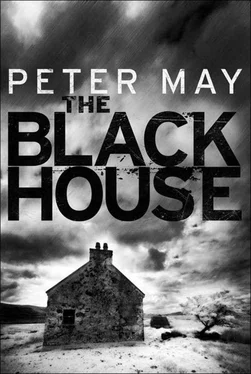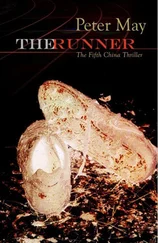Peter May - The Blackhouse
Здесь есть возможность читать онлайн «Peter May - The Blackhouse» весь текст электронной книги совершенно бесплатно (целиком полную версию без сокращений). В некоторых случаях можно слушать аудио, скачать через торрент в формате fb2 и присутствует краткое содержание. Жанр: Триллер, на английском языке. Описание произведения, (предисловие) а так же отзывы посетителей доступны на портале библиотеки ЛибКат.
- Название:The Blackhouse
- Автор:
- Жанр:
- Год:неизвестен
- ISBN:нет данных
- Рейтинг книги:5 / 5. Голосов: 1
-
Избранное:Добавить в избранное
- Отзывы:
-
Ваша оценка:
- 100
- 1
- 2
- 3
- 4
- 5
The Blackhouse: краткое содержание, описание и аннотация
Предлагаем к чтению аннотацию, описание, краткое содержание или предисловие (зависит от того, что написал сам автор книги «The Blackhouse»). Если вы не нашли необходимую информацию о книге — напишите в комментариях, мы постараемся отыскать её.
The Blackhouse — читать онлайн бесплатно полную книгу (весь текст) целиком
Ниже представлен текст книги, разбитый по страницам. Система сохранения места последней прочитанной страницы, позволяет с удобством читать онлайн бесплатно книгу «The Blackhouse», без необходимости каждый раз заново искать на чём Вы остановились. Поставьте закладку, и сможете в любой момент перейти на страницу, на которой закончили чтение.
Интервал:
Закладка:
‘Hey, bro,’ he drawled. ‘Wanna ride?’
And I certainly did. I wasn’t interested in where he had got it, or how. I just wanted to sit up there in the front beside him and cruise the island, and see the jealous looks on all the other kids’ faces. An open-topped car on the Isle of Lewis was almost unheard-of. After all, when would you ever be able to use it with the roof down? On a handful of days in any given year, if you were lucky. Well, that year we were big-time lucky. The good weather had scorched the island brown through July, and it was still holding.
We loaded four boxes of beer into the boot from my aunt’s lean-to, where I had been storing it. Donald’s father would not have permitted such contraband to be kept at the manse. My aunt came out to see us off. When I think back now, I can see that perhaps she was not well, even then. Though she never said a word to me about it. But she was pale, and thinner than she had been. Her henna-dyed hair was wispy and sparse, with half an inch of white at the roots. Her make-up was caked and pasty, crumbling in the creases of her over-rouged cheeks. Mascara was clogged in her lashes, and her mouth was a slash of pale pink. She was wearing one of her diaphanous creations, layers of different-coloured chiffon pinned into something resembling a cape, over cut-off jeans and pink open sandals. Her toenails were painted pink, too. Thick, horny nails in feet made ugly by arthritis.
She had been my mum’s big sister. Ten years older than her. And two more different people it would be hard to imagine. She must have been in her thirties during the hippy days of the 1960s, but that was her defining era. She’d spent time in London and San Francisco and New York, the only person I ever met who had actually been at Woodstock. It’s strange how little I know about her, really. The young are not curious about their elders, they just accept them for what they are. But I wish now I could go back and ask her about her life, fill in all those gaps. But, of course, you can’t go back. She had never been married, I knew that, but there had been some big relationship with someone famous. And wealthy. And married. When she returned to the island she bought the old whitehouse overlooking Crobost harbour and lived there on her own. As far as I knew she never told anyone what happened. Perhaps she confided in my mother, but I would have been too young for my mother to have told me. I think there was only ever one great love in her life, a life on which she seemed simply to close the door when she moved into the old whitehouse. I have no idea how she lived, where her money came from. We could never afford the luxuries, but I never wanted for food or clothes, or anything that I really desired. When she died there was ten pounds in her bank account.
My aunt was an enigma, one of the great unexplored mysteries of my life. I lived with her for nine years, and yet I cannot say that I ever knew her. She didn’t love me, I can say with some certainty. Nor I her. I would say she tolerated me. But she never had a harsh word. And she always took my part when the world was against me. There was — how can I put it? — a kind of unspoken, almost reluctant, affection between us. I don’t think I ever kissed her, and the only time I can remember her holding me was the night my parents died.
She loved the car. I suppose it must have appealed to that long-lost free spirit in her. She asked Donald if he would take her for a ride, and he told her to jump in. I sat in the back as he tore up the cliff road and over to Skigersta, sparks flying from the cigarette my aunt insisted on trying to smoke. Her hair blew back from her face to reveal its fragile, bony structure, crepe-like skin stretched tight over all its slopes and angles, like a death mask. And yet I don’t think I had ever seen her so happy. When we got back to the house there was a radiance about her, and I think she almost wished she was going with us. When I looked back as the car slipped over the brow of the hill towards Crobost she was still standing watching us go.
We picked up Iain and Seonaidh and some more beer at the bottom of the hill and set off south for Great Bernera. It was a glorious drive down the west coast, with the warm wind battering our faces and the sun burning our skin. I had never seen the ocean so calm, glittering away towards a hazy horizon. A gentle swell, as if it were breathing slow and steady, was the only perceptible movement. Kids waved to us in village after village. Siadar, Barvas, Shawbost, Carloway, and some of the older folk stood and watched in amazement, figuring no doubt that we were tourists from the mainland, mad folk brought across the water in the belly of the Suilven . The standing stones at Calanais ranged in silent silhouette against the western sky, another of life’s mysteries that we were unlikely ever to unravel.
By the time we found the jetty at the north-east point of Great Bernera, the sun was sinking lower in the sky and flooding the ocean with its dazzling liquid gold. We could see Eilean Beag sitting low in the water just a couple of hundred yards from the shore. It was no more than half a mile long, and maybe three or four hundred yards wide. The shieling sat close to the shore and there were several fires already burning at various points around it and along the beach, smoke hanging above the island in the still air. We could see figures moving about, and the sound of music carried as clear as a bell across the strait.
We unloaded the beer from the car and Donald parked it on the bank beside several dozen others. Seonaidh rang the bell on the jetty, and a few minutes later someone began rowing a boat across to fetch us.
Eilean Beag was fairly flat and featureless, summer grazing for sheep, but it had a fine, sandy beach along its southern fringe, and another shingle beach along the north-west flank. There must have been nearly a hundred people on the island that night. I knew hardly any of them. I supposed a lot of them must have come from the mainland. They were gathering in animated groups of those who knew one another, each with their own fire, each with their own music pounding out from their own ghetto blasters. The smell of barbecued meat and fish filled the air. Girls were wrapping food in tinfoil parcels to bury in the embers. Although I had no idea whose party it was, it did seem remarkably well organized. When we first got ashore, Donald slapped me on the back and said he’d catch me later. He had a rendezvous with a quarter-ounce of dope. Me and Iain and Seonaidh stacked the beer with the rest of the booze at the shieling, and opened ourselves some cans. We found some kids we knew from school and spent the next couple of hours drinking and talking and eating fish and chicken straight from the fire.
Night seemed to fall suddenly, darkness catching us unawares. The sky still glowed red in the west and fires were stoked and refuelled with driftwood to give more light. I don’t know why, but a certain melancholy descended on me with the dark. Perhaps I was too happy and knew it couldn’t last. Maybe it was because it was my last summer on Lewis, although I had no idea then that I would only ever return once, for a funeral. I opened a fresh can and wandered off among the fires strung out along the shore, animated faces gathered around them reflecting their light, laughing, drinking, smoking. Mixed now with the smell of woodsmoke and barbecue was the sweet, woody perfume of marijuana. From the water’s edge, I looked up at a sky free from any light pollution, and felt myself filled with a sense of wonder at its vast, inky, starlit span. There are moments when you look at the sky and you feel that everything revolves around you, and other times when you just feel infinitesimally small. That night I felt like the merest speck of dust in the history of infinity.
Читать дальшеИнтервал:
Закладка:
Похожие книги на «The Blackhouse»
Представляем Вашему вниманию похожие книги на «The Blackhouse» списком для выбора. Мы отобрали схожую по названию и смыслу литературу в надежде предоставить читателям больше вариантов отыскать новые, интересные, ещё непрочитанные произведения.
Обсуждение, отзывы о книге «The Blackhouse» и просто собственные мнения читателей. Оставьте ваши комментарии, напишите, что Вы думаете о произведении, его смысле или главных героях. Укажите что конкретно понравилось, а что нет, и почему Вы так считаете.












